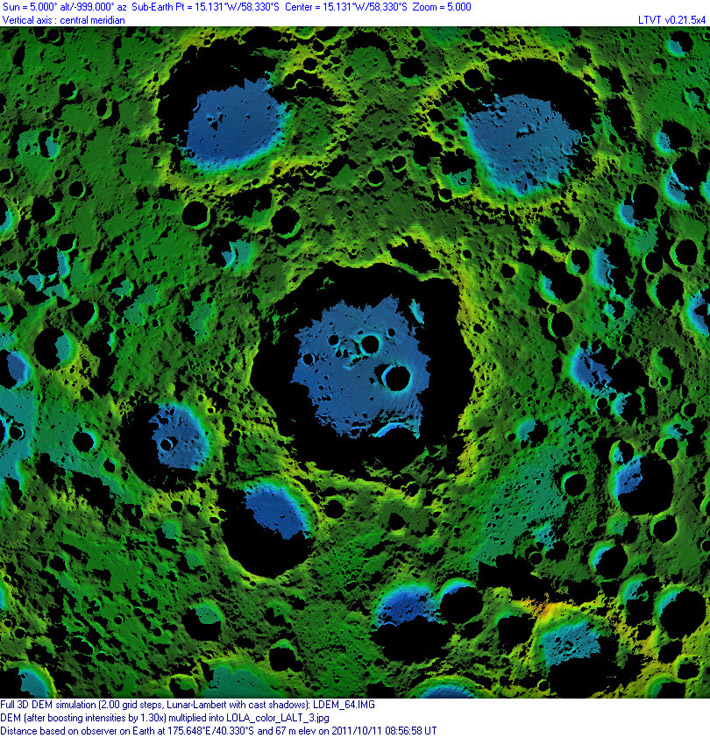Difference between revisions of "October 12, 2011"
| Line 3: | Line 3: | ||
<!-- ws:start:WikiTextHeadingRule:0:<h1> --> | <!-- ws:start:WikiTextHeadingRule:0:<h1> --> | ||
<!-- ws:start:WikiTextLocalImageRule:6:<img src="/file/view/LPOD-Oct12-11.jpg/263821357/LPOD-Oct12-11.jpg" alt="" title="" /> -->[[File:LPOD-Oct12-11.jpg|LPOD-Oct12-11.jpg]]<!-- ws:end:WikiTextLocalImageRule:6 --><br /> | <!-- ws:start:WikiTextLocalImageRule:6:<img src="/file/view/LPOD-Oct12-11.jpg/263821357/LPOD-Oct12-11.jpg" alt="" title="" /> -->[[File:LPOD-Oct12-11.jpg|LPOD-Oct12-11.jpg]]<!-- ws:end:WikiTextLocalImageRule:6 --><br /> | ||
| − | <em>LRO altimetry image processed by [mailto://mauricejscollins@hotmail.com// | + | <em>LRO altimetry image processed by [mailto://mauricejscollins@hotmail.com// Maurice Collins], New Zealand</em><br /> |
<br /> | <br /> | ||
Clavius is big enough to make us wonder if it could be a small two-ring basin. Some off-center hills on its floor hint at a possible inner ring - like nearby Bailly - but there is no convicing evidence. Maurice constructed this image to investigate if Clavius might have an outer ring, and again nothing is compelling. But the image itself is fascinating. It is made from the Lunar Reconnaissance Orbiter LOLA altimetry data, with high spots in gold, low ones in blue, and green being all the intermediate elevations. Maurice made this image by using a modified version of Jim Mosher's LTVT software that allows him to have the sun shining inwards, from all directions, towards the center of Clavius. This results in a dramatic depiction of shadows for the entire rim of Clavius. The very unequal lengths of shadows show that local vagaries of geology - such as craters cutting Clavius' rim or slumps of material from the rim - are common. Also of interest is the splaying outward of the rim at bottom right. This doesn't show up in normal images.<br /> | Clavius is big enough to make us wonder if it could be a small two-ring basin. Some off-center hills on its floor hint at a possible inner ring - like nearby Bailly - but there is no convicing evidence. Maurice constructed this image to investigate if Clavius might have an outer ring, and again nothing is compelling. But the image itself is fascinating. It is made from the Lunar Reconnaissance Orbiter LOLA altimetry data, with high spots in gold, low ones in blue, and green being all the intermediate elevations. Maurice made this image by using a modified version of Jim Mosher's LTVT software that allows him to have the sun shining inwards, from all directions, towards the center of Clavius. This results in a dramatic depiction of shadows for the entire rim of Clavius. The very unequal lengths of shadows show that local vagaries of geology - such as craters cutting Clavius' rim or slumps of material from the rim - are common. Also of interest is the splaying outward of the rim at bottom right. This doesn't show up in normal images.<br /> | ||
<br /> | <br /> | ||
| − | <em>[mailto:tychocrater@yahoo.com | + | <em>[mailto:tychocrater@yahoo.com Chuck Wood]</em><br /> |
<br /> | <br /> | ||
<strong>Related Links</strong><br /> | <strong>Related Links</strong><br /> | ||
Revision as of 17:40, 11 January 2015
Shadowrama

LRO altimetry image processed by Maurice Collins, New Zealand
Clavius is big enough to make us wonder if it could be a small two-ring basin. Some off-center hills on its floor hint at a possible inner ring - like nearby Bailly - but there is no convicing evidence. Maurice constructed this image to investigate if Clavius might have an outer ring, and again nothing is compelling. But the image itself is fascinating. It is made from the Lunar Reconnaissance Orbiter LOLA altimetry data, with high spots in gold, low ones in blue, and green being all the intermediate elevations. Maurice made this image by using a modified version of Jim Mosher's LTVT software that allows him to have the sun shining inwards, from all directions, towards the center of Clavius. This results in a dramatic depiction of shadows for the entire rim of Clavius. The very unequal lengths of shadows show that local vagaries of geology - such as craters cutting Clavius' rim or slumps of material from the rim - are common. Also of interest is the splaying outward of the rim at bottom right. This doesn't show up in normal images.
Chuck Wood
Related Links
Rükl plate 72



